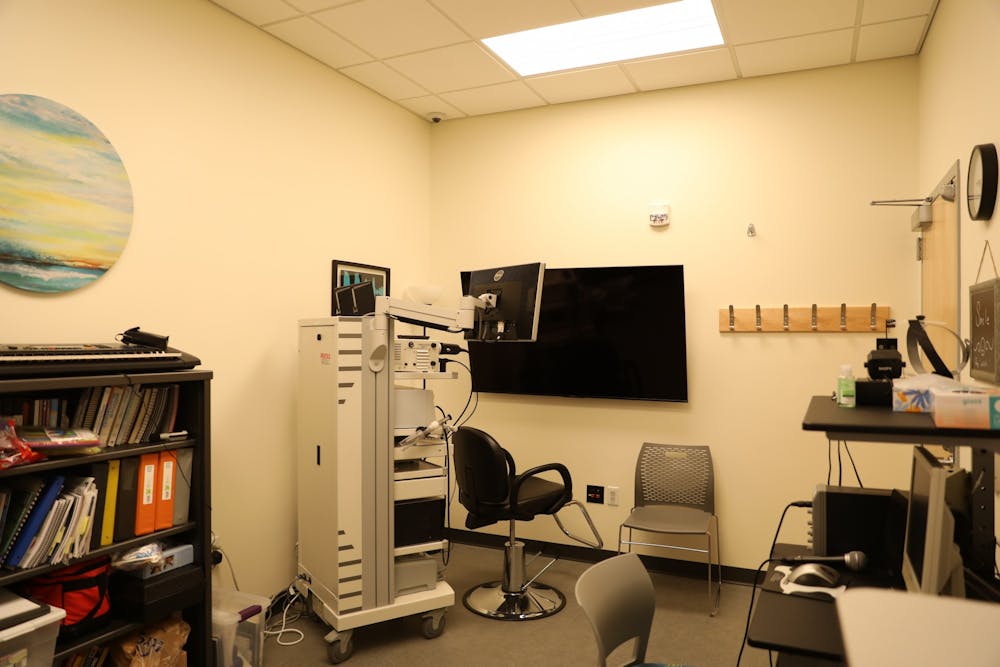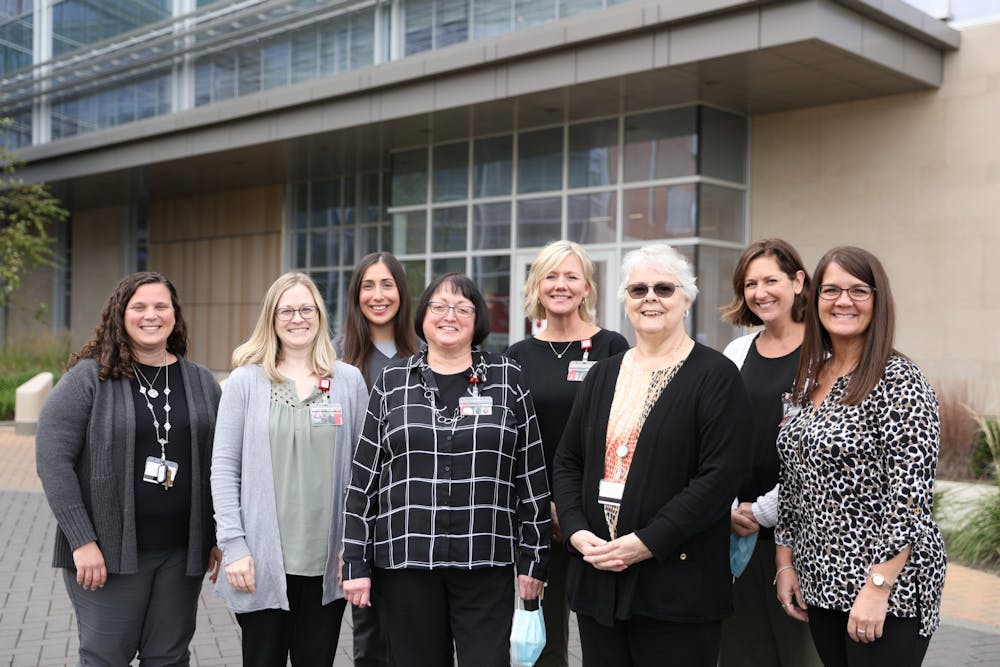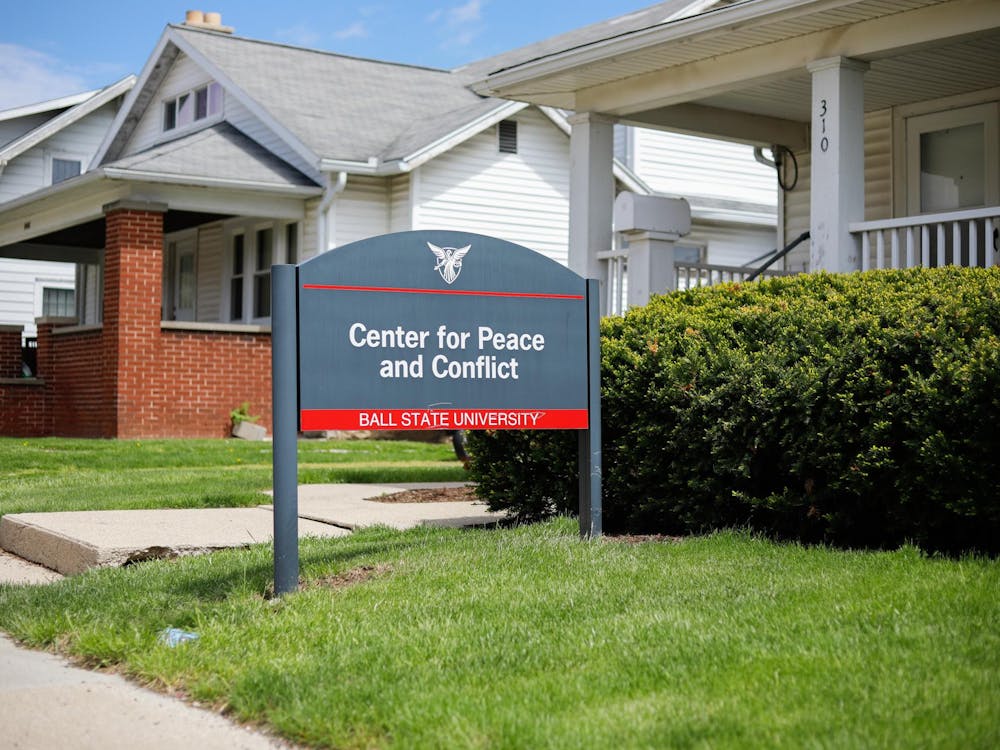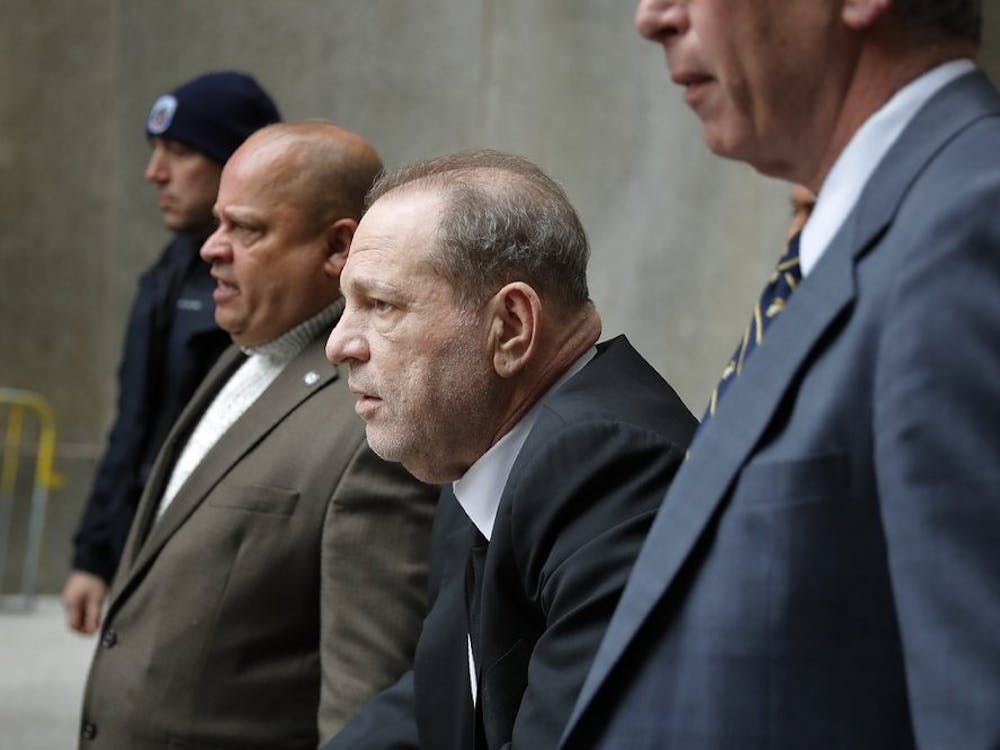Learn more about the Speech-Language Clinic
Fall and Spring Hours: 8 a.m. - 5 p.m. Monday – Friday
Summer Hours: 7:30 a.m. - 4:30 p.m. Monday – Friday
Call to make an appointment: 765-285-8160
Address: Health Professions Building, 1613 W. Riverside Ave.
Muncie IN 47303, Room 254
Enter east-end door A or B and go to the second floor
Source: Speech-Language Clinic Website
One of Kate Avila’s favorite memories from working in Ball State’s Speech-Language Clinic is from when a client made a birthday cake and shared it with her supervisor and student clinician.
“[She] was so excited to share it with us and wanted to have a birthday party with us because we were making an impact in her life,” Avila said. “We were part of her life.”
The Speech-Language Clinic, which has been in business for more than 50 years, is located in the Health Professions Building on campus and provides speech therapy in Muncie and surrounding communities.
Avila, a speech-language pathology graduate student, said she enjoys the welcoming and inviting community inside the clinic.
“Everyone is there to help each other,” Avila said. “I feel like that's really been a huge support in my education, and I think it's brought the best out of me as a student, so I think that's what's been so special about being at this clinic.”
Avila received her undergraduate degree from Ball State in May 2020 with a major in speech-language pathology and a minor in psychology of human development. She plans to receive her master’s degree in summer 2022.
The fall 2021 semester is Avila’s fifth semester working in the clinic and her fourth as a student clinician, as students have an undergraduate semester with the clinic first as part of a required class for speech-language pathology graduate students.

A resource room is pictured in the Speech-Language Clinic in the Health Professions Building Oct. 19. The clinic staff uses boardgames, blocks, legos and books for therapeutic purposes. Rylan Capper, DN
Avila said she works on campus in the clinic now, but to get her degree, she will have two more semesters as a student clinician off campus. One will be in a school setting, and one will be in a health care setting — such as a hospital, skilled nursing facility or private practice clinic. She starts her day in the clinic at 7 a.m. and works at the clinic while taking classes for her degree.
“It starts early,” Avila said. “I mean, especially when you get into the thick of things in the semester when all your clients are going, and the clinic is up in full running and there’s diagnostic evaluations going on with regular treatment. It is busy — we have a lot of people coming and going, and it’s a lot of moving parts. It takes a lot of people to keep it going.”
Rebecca Kadinger has worked as a supervisor in the clinic for nine years. She has worked in different clinics outside of campus before but said the Ball State faculty is welcoming and “everybody’s here for everybody.”
Although the clinic sees more children than adults, it treats people “across the lifespan,” Kadinger said. The clinic may exist to help people with their speech, but having patients of all ages is what keeps it running. Kadinger said she wants to remind the community that the clinic sees “school-age adolescents and adults.”
The clinic strives to make improvements for both its students’ and patients’ lives, Kadinger said, and she often sees the clinic bustling during its operating hours with people coming for therapy.
“There's days that are so busy from 8 a.m. to 5 p.m.,” Kadinger said. “That's our hours in the clinic, so if you were to walk through our clinic on an average day, you're going to see students coming and going.”
Having a wide age range is something “great about [her] profession,” Kadinger said, and both Kadinger and Avila said one of their favorite parts about working in the clinic is seeing patients make progress in therapy.
“We can’t get bored,” Avila said. “It also makes it hard. It’s a good problem to have, but I’ve enjoyed all the clients that I’ve worked with in the clinic.”
Avila said she finds it difficult to choose what age group she would like to work with in the future because she’s had so many positive experiences with people of all ages, but she knew she wanted to pursue speech pathology because of the relationships it would allow her to build.
“The reason that I chose speech pathology was I like to make connections with people,” Avila said. “I wanted to see that I had a direct impact on someone’s life for the positive. There are times where you kind of get caught up in the process and you get caught up on the treatment and the clinical side of things. And then, your client brings you back to that personal side when you least expect it.”

The Voice Lab is pictured in the Speech-Language Clinic of the Health Professions Building Oct. 19. The clinic offers numerous diagnostic and rehabilitative services. Krystiana Brosher, DN
After spending five semesters in the clinic, Avila has collected memories of specific clients who have remembered her name and wanted to see her again.
“Another client, after I had moved on, [the] next semester he had a new clinician [and] was asking about me, what I was up to and if I could come see him or say ‘hi,’” she said.
When the Health Professions Building was in construction, Kadinger got to help plan for what the clinic would look like and how it would function, which she said was beneficial for her and the staff because they could pick out the sizes for each room and decide earlier on what the function will be.
“One of the best memories was working together to make sure that this clinic was what our students can learn best in to treat our clients and a space that's going to be good for their learning,” Kadinger said.
Although the clinic has been around for more than 50 years, it is ever-changing and evolving. Kadinger said the clinic offers services for transgender voice modification or accent modification for those who are not native speakers, in addition to its general speech pathology services.
The Speech-Language Clinic recently received a 2021 Parkinson Voice Project Award SPEAK OUT and LOUD Crowd Grant. The clinic also received the same grant in 2019, which is helping it purchase supplies to start more treatment groups. One group includes a literary clinic, which helps Muncie schools identify struggling readers and have them come to the clinic for intensive reading help.
“We treat a specialty population, so like Parkinson’s disease, people who’ve had a stroke, fluency or disfluency — a lot of people would recognize this as stuttering,” Kadinger said. “We are a resource in the community, and they help us and our students as much as we are hopefully helping them as well.”
Contact Krystiana Brosher with comments at krystiana.brosher@bsu.edu or on Twitter @Krystiana_21.





